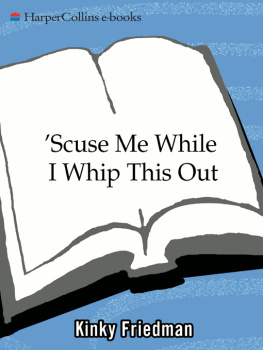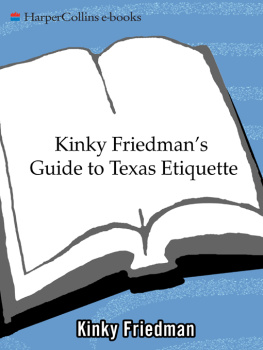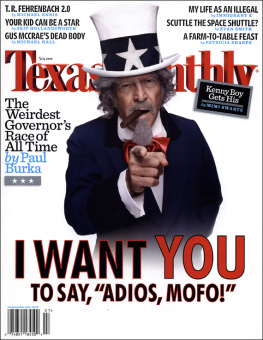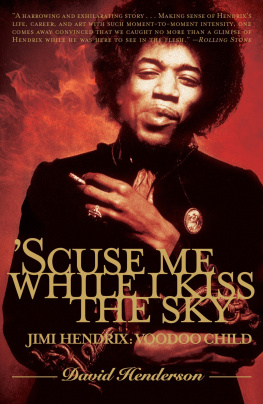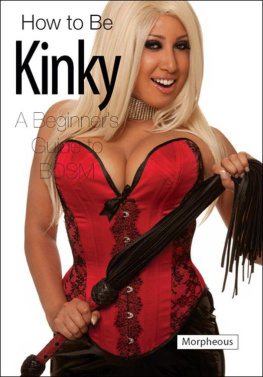B oth Willie Nelson and George W. Bush are friends of mine. In fact, over the years Ive known them, to paraphrase my father, theyve moved up from friends to contacts. Willie, depending on which polls you read, is quite often more popular than George, but then Willie never gets to ride on Air Force One.
In Scuse Me While I Whip This Out, you may see another, extremely humorous side of these two great Americans, a side that most people never get to observe. After all, Im a writer of fiction who tells the truth. Thats one reason Im contemplating running for (or, at my age, taking a leisurely stroll toward), governor of Texas in 2006. Im fifty-nine but I read at the sixty-one-year-old level.
Willie and George, of course, have both offered to help with my campaign. George told me he would answer any questions that I had. Ill be your one-man focus group, he told me recently. Willie says, In a Friedman administration, Id like to be head of the Texas Rangers. If not that, then head of the DEA. George, as you will soon discover, even went so far as to offer me a job. Sort of. Willie, not to be outdone, has offered me many things. One of them was a joint the size of a large kosher salami.
In the course of this book, as well as George and Willie, youll also meet other endearing characters I have known, such as Bill Clinton, Bob Dylan, Joe Heller, Don Imus, Irv Rubin, and Billy Joe Shaver, as well as those I have known only in spirit, Moses, Jesus, Jack Ruby, and Hank Williams to name a few. As the Beatles sang, Some are dead and some are living / In my life Ive loved them all.
The people in this book are troublemakers because they have caused us to think, and quite often they have led us in new and different directions. They have dared to stir the putrid pot of humanity every now and then, and each one of them has paid dearly for it. I feel proud and privileged to live in a country where I can so freely follow in their footsteps.
T he life of a country singer can at times be very tedious. You have to pretend that your life is a financial pleasure even when your autographs are bouncing. You often fall prey to the serious songwriters self-pity syndrome. You begin to believe that all dentists and married couples are happier than you are. Manys the night you feel lonely, empty, homesick for heaven. Everybody you know thinks youve got it made and suddenly you find youre a jet-set gypsy cryin on the shoulder of the highway. Believe me when I tell you, its lonely in the middle.
SUDDENLY YOU FIND YOURE A JET-SET GYPSY CRYIN ON THE SHOULDER OF THE HIGHWAY.
But long before the Outlaw Movement, as we now call it, came along in the 1970s, there were great voices in country music who never fit in wherever they were. Their spirits and songs somehow survived that all-pervasive white noise called the Nashville Sound even before it had a name. I shivered for Jimmie Rodgers, the Singin Brakeman, standing in the rain waiting for fast freights and faithless women who never came, who finally sang the TB blues, dying out like a train whistle in the night, the lantern still swinging in his hand. And Hank Williams, skinny, hungry, spiritually horny, for whom all the world was a stage. Shakespeare of the sequined summer stock. Hank died when he was twenty-nine years oldperfect timing for a country music legend, dreaming his last backseat dreams in the backseat of that shimmering, earthbound Cadillac, on his way to a show in Canton, Ohio, he would never get to play. Some people will do anything to get out of a gig in Canton, Ohio.
I SHIVERED FOR JIMMIE RODGERS, THE SINGIN BRAKEMAN, STANDING IN THE RAIN WAITING FOR FAST FREIGHTS AND FAITHLESS WOMEN WHO NEVER CAME.
Now where was I before I started hearing voices in my head? Oh, yeah. It was Nashville in the early seventies. Most of the songs sounded alike, most of the singers looked alike, and most of the songwriters thought alike if they thought at all. Sound familiar? Well, that was the problem for one songwriter and pig farmer named Willie Nelson who left Music City for Texas in a daring journey some modern biblical scholars now refer to as the Exodus. He wanted to make his own music his own way and not be a slave to the record company or the powers that be. Willie was soon to lead a band of long-haired hippie cowboys farther into musical history than anyone imagined. Today he modestly says: I just found a parade and jumped in front of it.
Waylon Jennings at the same time was fighting the same battle in Nashville. Like all of us, he struggled with his own demons as he struggled against the musical establishment. One of my first memories of Waylon was one day as I was walking up an alley behind Music Row, and he drove up in a big Cadillac and a cloud of dust. He pulled up beside me and lowered the window and I swear he looked part devil and part smilin mighty Jesus. On that day he gave me some words to live by that I have never forgotten. He said: Get in, Kink. Walkins bad for your image.
HE PULLED UP BESIDE ME AND LOWERED THE WINDOW AND I SWEAR HE LOOKED PART DEVIL AND PART SMILIN MIGHTY JESUS.
Tompall Glaser of the Glaser Brothers was the first successful Nashville cat to open up his studio to many of us with weird songs, ideas, and hours. That was where I first met Captain Midnite, the most-often-fired disc jockey in Nashville, and a man whom, I believe, was one of the major spiritual linchpins of the whole Outlaw Movement. Midnite once stayed up for six days, told me it felt like a week, and then gave me his most cherished possession, his cowboy hat. I wore it for a while until Tompall violently yanked it from my head during a rather intense pinball game, proceeded to wear it for a while, and then gave it to Waylon.
GET IN, KINK. WALKINS BAD FOR YOUR IMAGE.
Soon everyone was wearing hats, swapping hats, and swapping song lyrics in a spirit that hadnt been seen since God had created Nashville. Tompall claims that that pinball moment when he grabbed my hat and put it on his head without even tilting was the moment the Outlaw Movement spiritually began. Bill Monroe and Ernest Tubb, of course, he noted respectfully, had always worn hats.
Billy Joe Shaver probably was the purest, most Che Guevaralike spirit of the whole gang. In 1973 Waylon Jennings recorded an album made up almost entirely of Billy Joe Shaver songs. It was called Honky Tonk Heroes and it remains the very best the times had to offer.
Wanted: The Outlaws. Theyre wanted, all right. Today I only listen to country music on the radio at gunpoint. It seems to me to be a virtual wasteland populated by hat acts, soundalikes, and anti-Hanks. When the Outlaws were on the loose, songs were written in blood, sung by people whod loved and cried them, lived and died them. Some of us were crucified on crosses of vinyl. Some were stoned for their ideas; stoned for their hairy, scary, soon to be legendary lifestyles; or just plain stoned. Billy Joe Shaver wrote Honky Tonk Heroes and we were. Lee Clayton wrote Ladies Love Outlaws and they did. Willie had been wandering like a modern-day Moses in the Texas desert. Waylon had been a rebel without a clause in his recording contract to say and sing what he believed. And in Austin, Jerry Jeff Walker had just thrown his new color TV into his swimming pool. As for myself, I think I was always leaving my soul at the dry cleaners in the last town we played.

